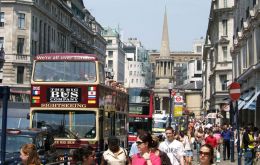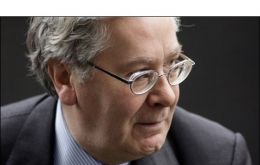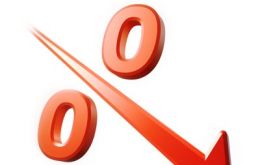MercoPress. South Atlantic News Agency
Tag: Bank of England
-
Friday, August 13th 2010 - 02:40 UTC
UK faces “choppy recovery” in the next two years warns Bank of England

The UK economy faces a “choppy recovery” over the next two years, the governor of the Bank of England, Mervyn King, has warned. His comments came as the Bank lowered its economic growth forecast and said inflation would stay higher for longer than previously forecast.
-
Friday, August 6th 2010 - 06:01 UTC
Bank of England leaves rate on hold at 0.5%; concerns over recovery strength

The Bank of England has voted to keep interest rates on hold at 0.5% amid concerns over the strength of the economic recovery. The decision by the bank's Monetary Policy Committee (MPC) means rates will stay at their current record low for an 18th month. It suggests the committee does not see high inflation as a serious concern.
-
Friday, July 9th 2010 - 05:29 UTC
UK leaves rates at a record low for the 16th month running

The Bank of England has kept UK interest rates on hold at a record low of 0.5% for the 16th consecutive month. The Bank's Monetary Policy Committee (MPC) also decided on Thursday not to inject any more money into the economy under its policy of quantitative easing (QE).
-
Tuesday, June 29th 2010 - 05:04 UTC
European crisis ‘key risk’ for UK banking sector, warns Bank of England

The European debt crisis is a “key risk” to the UK's banking sector and banks should build up their cash reserves in response, the Bank of England has warned. In its latest financial stability report, the central bank welcomed recent measures taken by the EU to stem the crisis.
-
Tuesday, May 18th 2010 - 21:53 UTC
UK consumer inflation reaches 17-month high in April

United Kingdom consumer price inflation unexpectedly jumped to a 17-month high in April, 3.7%, driven by big rises in tax on alcohol and tobacco as well as higher prices for women's clothing and food, data showed.
-
Wednesday, May 12th 2010 - 01:20 UTC
Bank of England “No-Change” Policy; Leaves Assets-Purchase Program at £ 200bn

The Bank of England held interest rates at record lows as policy-makers weighed up the impact of a Eurozone bailout and a hung parliament. The Bank's Monetary Policy Committee voted to hold rates at 0.5% and left its £200 billion program to boost the money supply unchanged.
-
Friday, April 23rd 2010 - 02:45 UTC
UK record borrowing in 2009/10 to cover biggest budget deficit since WW2

UK Primer Minister Gordon Brown’s government borrowed a record £163.4 billion in the 2009/2010 financial year, according to figures published Thursday. While it is the biggest budget deficit since the Second World War, the figure is lower than Chancellor Alistair Darling’s prediction in the budget of £166.5 billion for the year.
